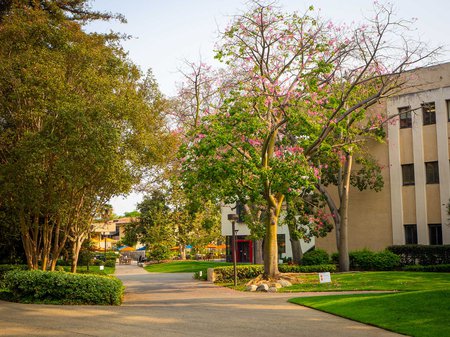Though higher education has made great strides in diversifying its student body in the past few decades, diversity among the faculty has, broadly speaking, remained low. Data show that only around five percent of STEM faculty members in the U.S. are persons of color.
In an effort to address that disparity, Caltech joined with UC Berkeley, UCLA, and Stanford University in 2013 to form the California Alliance for Graduate Education and the Professoriate (AGEP). The goal was to help diversify the faculty by providing support and resources for underrepresented minority graduate students who are interested in postdoctoral scholarship and careers in academia.
Seven years later, the program has received a boost with new funding from the National Science Foundation and is expanding nationally with the inclusion of five additional universities: the University of Michigan, Harvard University, Georgia Tech, the University of Texas at Austin, and the University of Washington. The expanded consortium is known as the Research University Alliance (RUA).
Through the programs offered by the new consortium, Caltech will continue to provide the same kind of resources and professional development as AGEP, says Hanna Song, senior director for inclusion and diversity. These include networking opportunities with other students in the program; assistance with resumes and job applications from the Hixon Writing Center; an annual breakfast with Caltech president Thomas Rosenbaum; and the Research Exchange program, which allows participating grad students and postdoctoral fellows to visit the labs of faculty members at other universities in the consortium, to learn new techniques and to network to help find future positions.
"We have a framework that allows students and postdocs to actually start making connections to their peers and faculty at other universities," says Doug Rees, Roscoe Gilkey Dickinson Professor of Chemistry, who co-administers the program at Caltech with Cindy Weinstein, Eli and Edythe Broad Professor of English, vice provost, and chief diversity officer. "The opportunity to go and spend a week at another university provides a great opportunity for graduate students and postdoctoral fellows to get to know a new lab and department."
RUA, like AGEP before it, will continue to work in conjunction with another Caltech initiative, the Presidential Postdoctoral Fellowship Program, which provides stipends, mentoring, community development, and professional development to its fellows, Rees says.
Rees and Song both point out that the expansion of RUA to additional schools will give graduate students and postdoctoral fellows at Caltech (and other schools in the consortium) stronger connections to other universities when they are advancing to the next stages of their careers.
"We're a small school, but this provides us with access to a much larger pool of faculty and departments who will be hiring our graduate students and postdocs," Rees says.
A major success of Caltech's participation in the program thus far has been the development of a strong cohort model for its AGEP (now RUA) students through the Presidential Postdoctoral Fellowship Program, Song says, giving students in the program peers they can turn to. Song adds that Caltech's program has seen a great deal of success in shepherding graduate students into the faculty at other universities. "At least half of our AGEP alums are in tenure-track positions in various top-tier research universities now," she adds. "We are concretely, one person at a time, diversifying the pipeline from postdoc to faculty."
For more information about the program, visit https://diversity.caltech.edu/about/who_we_serve/agep.
Written by Emily Velasco




